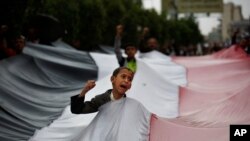Envoys from Yemen's warring parties are in Kuwait for a third try Monday at United Nations mediated talks aimed at ending an 18-month conflict that has killed more than 6,000 people and created a devastating humanitarian crisis in the region's poorest country.
"We are ready for a political transition which excludes no one... and we will give everything we can to alleviate the suffering," Yemen Foreign Minister Abdel Malek told the state news agency, Saba, ahead of Monday's talks.
Iran-backed Houthi rebels also hinted at reconciliation, with spokesman Mohammed Abdul-Salam using Kuwaiti media to call for "a consensus authority during a definite transitional phase to decide every political dispute."
U.N.-sponsored peace talks in 2015 twice failed to end the combat, with December talks crumbling under the weight of some of the fiercest battles in months.
The conflict has pitted the Sunni government of President Abdu Rabbu Mansour Hadi against Houthi rebels, who seized the capital, Sana'a, in September 2014, driving a former president into exile.
A Saudi-led Sunni military coalition entered the fray one year ago, bombing Houthi targets and obliterating entire Yemen communities.
Last week, U.N. special envoy Ismail Ould Cheikh Ahmed told the U.N. Security Council that success at the peace talks will require "difficult compromises from all sides, as well as determination to reach an agreement."
For his part, Yemen's U.N. envoy Khaled Alyemany told reporters the talks could yield concrete results. "If they fail," he warned, "it will be a repetition of the cycle of violence."




